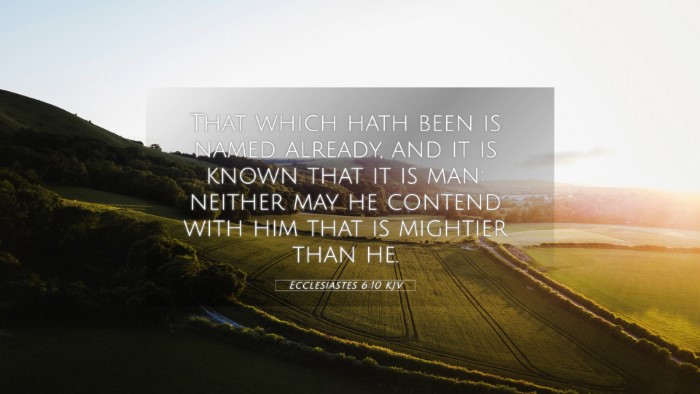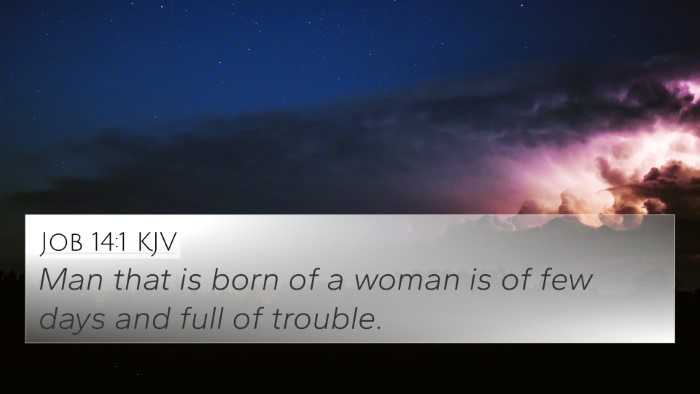Old Testament
Genesis Exodus Leviticus Numbers Deuteronomy Joshua Judges Ruth 1 Samuel 2 Samuel 1 Kings 2 Kings 1 Chronicles 2 Chronicles Ezra Nehemiah Esther Job Psalms Proverbs Ecclesiastes Song of Solomon Isaiah Jeremiah Lamentations Ezekiel Daniel Hosea Joel Amos Obadiah Jonah Micah Nahum Habakkuk Zephaniah Haggai Zechariah MalachiEcclesiastes 6:10 Similar Verses
Ecclesiastes 6:10 Cross References
That which hath been is named already, and it is known that it is man: neither may he contend with him that is mightier than he.
Uncover the Rich Themes and Topics of This Bible Verse
Listed below are the Bible themes associated with Ecclesiastes 6:10. We invite you to explore each theme to gain deeper insights into the Scriptures.
Ecclesiastes 6:10 Cross Reference Verses
This section features a detailed cross-reference designed to enrich your understanding of the Scriptures. Below, you will find carefully selected verses that echo the themes and teachings related to Ecclesiastes 6:10 KJV. Click on any image to explore detailed analyses of related Bible verses and uncover deeper theological insights.

Job 9:32 (KJV) »
For he is not a man, as I am, that I should answer him, and we should come together in judgment.

Isaiah 45:9 (KJV) »
Woe unto him that striveth with his Maker! Let the potsherd strive with the potsherds of the earth. Shall the clay say to him that fashioneth it, What makest thou? or thy work, He hath no hands?

Job 40:2 (KJV) »
Shall he that contendeth with the Almighty instruct him? he that reproveth God, let him answer it.
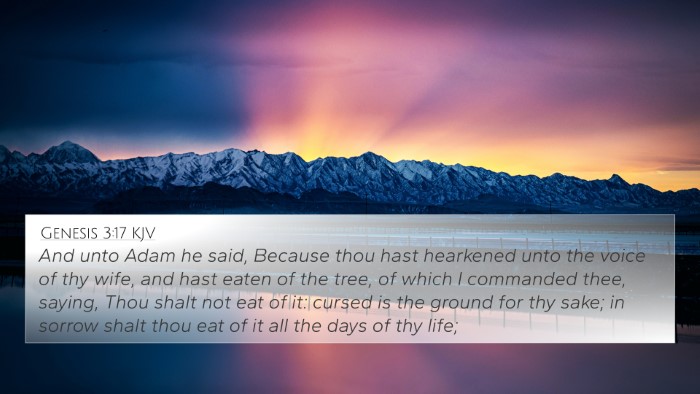
Genesis 3:17 (KJV) »
And unto Adam he said, Because thou hast hearkened unto the voice of thy wife, and hast eaten of the tree, of which I commanded thee, saying, Thou shalt not eat of it: cursed is the ground for thy sake; in sorrow shalt thou eat of it all the days of thy life;
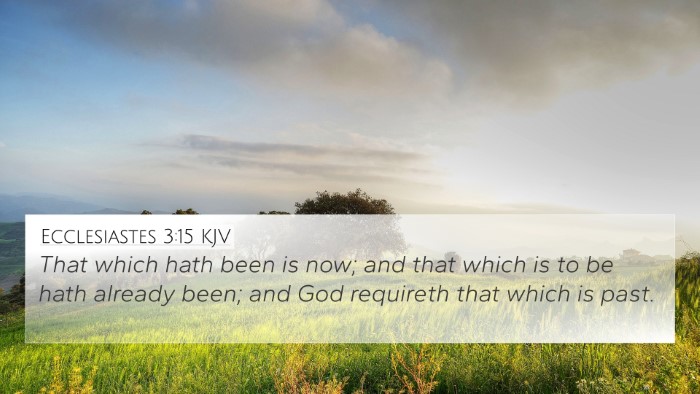
Ecclesiastes 3:15 (KJV) »
That which hath been is now; and that which is to be hath already been; and God requireth that which is past.

Romans 9:19 (KJV) »
Thou wilt say then unto me, Why doth he yet find fault? For who hath resisted his will?

Job 33:13 (KJV) »
Why dost thou strive against him? for he giveth not account of any of his matters.

Psalms 39:6 (KJV) »
Surely every man walketh in a vain shew: surely they are disquieted in vain: he heapeth up riches, and knoweth not who shall gather them.
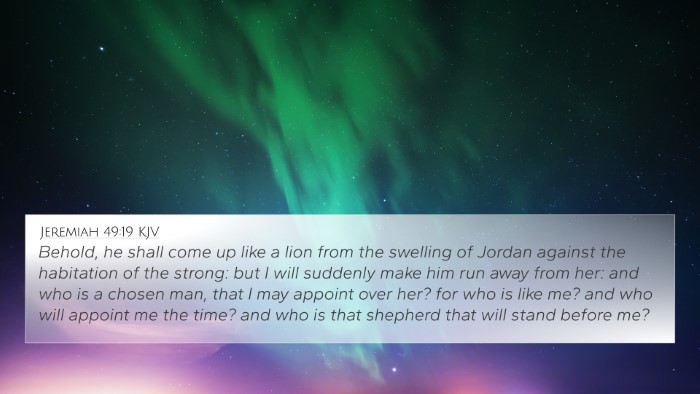
Jeremiah 49:19 (KJV) »
Behold, he shall come up like a lion from the swelling of Jordan against the habitation of the strong: but I will suddenly make him run away from her: and who is a chosen man, that I may appoint over her? for who is like me? and who will appoint me the time? and who is that shepherd that will stand before me?

Ecclesiastes 1:9 (KJV) »
The thing that hath been, it is that which shall be; and that which is done is that which shall be done: and there is no new thing under the sun.
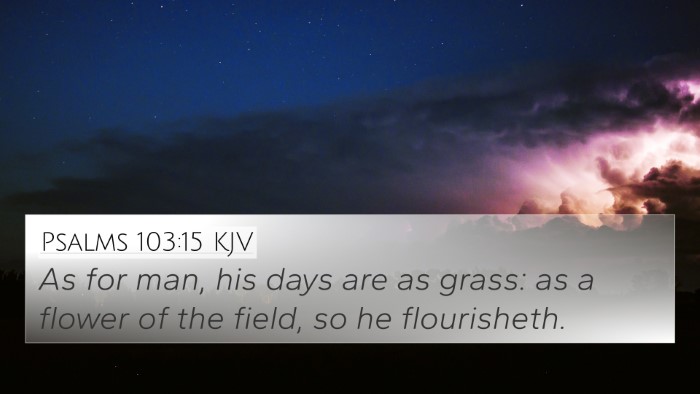
Psalms 103:15 (KJV) »
As for man, his days are as grass: as a flower of the field, so he flourisheth.
Ecclesiastes 6:10 Verse Analysis and Similar Verses
Understanding Ecclesiastes 6:10
Verse: Ecclesiastes 6:10 - "That which hath been is named already; and it is known that it is man: neither may he contend with him that is mightier than he."
Summary of Meaning
This verse provides a profound insight into the nature of humanity and the limitations of human existence. It emphasizes the inevitability of fate and the futility of attempting to alter what has already been decided. By stating that "that which hath been is named already," it indicates that there is a predetermined path for humanity that aligns with the created order established by God.
Interpretation and Insights
- Matthew Henry: He discusses how humans are inherently bound to their circumstances and that this limitation should foster humility. The idea that one cannot contend with what is "mightier" subtly points to the sovereignty of God in the affairs of man.
- Albert Barnes: He emphasizes the concept of the unchangeable nature of God's plans. The reference to "it is known that it is man" signifies that mankind's vanity does not allow for genuine contention with divine purpose.
- Adam Clarke: Clarke notes that this verse brings a sobering reminder that despite human ambition or struggle, there is a divine order that cannot be overridden. It serves as a warning against arrogance and pride, reminding us of our place within the divine hierarchy.
Key Themes
The primary themes presented in this verse include:
- The Sovereignty of God: A reminder that human efforts are ultimately under God's control.
- Human Limitation: An acknowledgment of the limitations placed upon man in the face of God's omnipotence.
- Nature of Existence: The acceptance of what has been set in motion in the world and the futility of resistance to that order.
Cross-References
Several Bible verses resonate with the themes of Ecclesiastes 6:10, providing deeper understanding through connections:
- Isaiah 45:9: “Woe unto him that striveth with his Maker! Let the potsherd strive with the potsherds of the earth.” – Highlights the futility of contending with God.
- Romans 9:20: “Nay but, O man, who art thou that replyest against God?” – Stresses human limitations in understanding God's will.
- Job 40:2: “Shall he that contendeth with the Almighty instruct him?” – Reinforces the message of God's supremacy over humanity.
- Psalms 39:5: “Verily, every man at his best state is altogether vanity.” – A reminder of the transient nature of human effort.
- Proverbs 21:30: “There is no wisdom nor understanding nor counsel against the Lord.” – Emphasizes the futility of human wisdom contrasted with divine wisdom.
- Proverbs 16:9: “A man's heart deviseth his way: but the Lord directeth his steps.” – Highlights divine sovereignty over human plans.
- Ecclesiastes 3:14: “I know that, whatsoever God doeth, it shall be forever: nothing can be put to it, nor anything taken from it.” – A strong affirmation of the permanence of God's works.
Thematic Connections
This verse's themes connect profoundly with various theological concepts within the Scripture, highlighting the importance of humility before God and the acceptance of His will:
Humility Before God
The recognition that humanity is powerless against divine will fosters a spirit of humility, as seen in:
- James 4:10: “Humble yourselves in the sight of the Lord, and he shall lift you up.”
- Micah 6:8: “He hath showed thee, O man, what is good; and what doth the Lord require of thee, but to do justly, and to love mercy, and to walk humbly with thy God?”
Understanding the Limits of Human Wisdom
The Scripture teaches the limitations of human understanding, which resonates with verses like:
- 1 Corinthians 3:19: “For the wisdom of this world is foolishness with God.”
- Proverbs 3:5-6: “Trust in the Lord with all thine heart; and lean not unto thine own understanding.”
Cross-Referencing and Deeper Studies
For those studying how to use Bible cross-references effectively when analyzing Ecclesiastes 6:10 or similar verses, consider:
- Utilizing a Bible concordance to locate themes and parallels.
- Exploring Bible reference resources such as commentaries and study guides that facilitate understanding of divine sovereignty.
- Engaging in cross-reference Bible study methods to expand insights across both the Old and New Testament.
Tools for Effective Cross-Referencing
Use the following as tools for an enriched understanding:
- A cross-reference guide to trace themes.
- Identifying connections between Bible verses for a holistic understanding.
- Employing a comprehensive Bible cross-reference system for deeper thematic studies.
Conclusion
Ecclesiastes 6:10 serves as a poignant reminder of the divine order and humanity’s place within it. The insights derived from public domain commentaries enrich our understanding, making it clear that humble acceptance of God's plans is paramount. In this pursuit, the use of various cross-referencing tools can yield fruitful reflections that bridge verses across the Bible, enhancing our spiritual journey.

